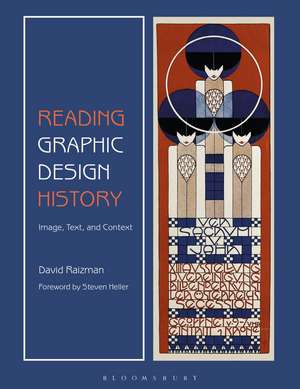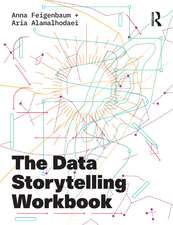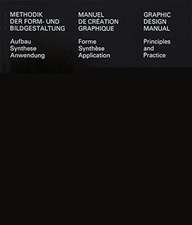Reading Graphic Design History: Image, Text, and Context
Autor Dr David Raizmanen Limba Engleză Hardback – 9 dec 2020
| Toate formatele și edițiile | Preț | Express |
|---|---|---|
| Paperback (1) | 162.06 lei 3-5 săpt. | +42.06 lei 7-13 zile |
| Bloomsbury Publishing – 9 dec 2020 | 162.06 lei 3-5 săpt. | +42.06 lei 7-13 zile |
| Hardback (1) | 473.26 lei 3-5 săpt. | |
| Bloomsbury Publishing – 9 dec 2020 | 473.26 lei 3-5 săpt. |
Preț: 473.26 lei
Preț vechi: 580.10 lei
-18% Nou
Puncte Express: 710
Preț estimativ în valută:
90.56€ • 94.55$ • 74.95£
90.56€ • 94.55$ • 74.95£
Carte disponibilă
Livrare economică 14-28 martie
Preluare comenzi: 021 569.72.76
Specificații
ISBN-13: 9781474299398
ISBN-10: 1474299393
Pagini: 304
Ilustrații: 33 colour and 190 bw illus
Dimensiuni: 189 x 246 x 23 mm
Greutate: 0 kg
Editura: Bloomsbury Publishing
Colecția Bloomsbury Visual Arts
Locul publicării:London, United Kingdom
ISBN-10: 1474299393
Pagini: 304
Ilustrații: 33 colour and 190 bw illus
Dimensiuni: 189 x 246 x 23 mm
Greutate: 0 kg
Editura: Bloomsbury Publishing
Colecția Bloomsbury Visual Arts
Locul publicării:London, United Kingdom
Caracteristici
Raizman's innovative approach encourages for a new way of looking at classic texts of graphic design, bringing cultural studies' concerns about gender, class and race to bear on graphic design history
Notă biografică
David Raizman is Distinguished University Professor Emeritus in the Department of Art and Art History at Drexel University, USA.
Cuprins
AcknowledgmentsList of IllustrationsForeword by Steven HellerIntroduction 1. Josef Müller-Brockmann: "schutzt das Kind!" and the Mythology of Swiss Design2. Koloman Moser's Thirteenth Secession Exhibition Poster (1902): Anatomy of a Work of Viennese Graphic Design3. Cassandre and Dubonnet: Art Posters and Publicité in Interwar Paris4. Frank Zachary at Holiday: Travel, Leisure, and Art Direction in Post-World War II America5. Food, Race, and the "New Advertising": The Levy's Jewish Rye Bread Campaign 1963-19696. Graphic Design and Politics: Thomas Nast and the "TAMMANY TIGER LOOSE"7. The Politics of Learning: Dr. John Fell and the Fell Types at Oxford University in the Later Seventeenth Century BibliographyIndex
Recenzii
Reading Graphic Design History is an important addition to the literature on Graphic Design. It serves a diverse audience of students, scholars, teachers and practitioners. This is the perfect companion volume to a survey text for anyone who teaches Graphic Design History. A collection of carefully researched and clearly presented case studies, each chapter offers a fresh and provocative reading of key works by important designers. Raizman's treatment covers a broad spectrum of issues from creative design through the production process to distribution and reception. Raizman is interested in the collaborative nature of Graphic Design as both an art form and a commercial enterprise. This is a gem of scholarship, treating multiple facets of a rich and complex subject in a masterful manner.
Raizman's expert analysis ranges across a spectrum of material artifacts to uncover what has, for too long, been neglected in histories of modern graphic design. Reading this book will reward those who hunger for meticulous and inventive interpretation.
Raizman treats each of his topics on its own terms, diving deeply into social, practical, and creative issues without shoehorning his subjects into ideological boxes. It is rare to find design writing this informative and this enjoyable.
Through a series of seven case studies across a variety of graphic and typographic design, Reading Graphic Design History offers many fresh perspectives on interpreting designed objects. Arguing that individual graphic designs warrant the attention of deeply-considered contextual analysis, Raizman brings new approaches and ideas to the growing critical literature on graphic design. The book will engage all those interested in understanding how graphic design works, as well as serve students of graphic design and design history alike as a standard point of reference.
David Raizman has done a great service to the studies of graphic design history with Reading Graphic Design History. Not only will the work be a fine addition to libraries but significantly, it should also find a place in the studio. Its intention to engage with students in a practical way is evident in the case study approach, and the very wide range of sources and over 200 valuable illustrations. Importantly, Raizman has emphasized aspects of graphic design history that are often overlooked, including, advertising and fine art, but also has made an engagement with the physical formats and technologies of production. His often forensic investigation within his case studies demonstrates how design history can be particularly useful within a studio teaching context, as it not only focused on the object but draws together a wide range of valuable contextual research. This important contribution, by a renowned scholar, has set a bench mark for future approaches to the methodologies used in design history.
David Raizman follows his History of Modern Design with heavily-illustrated 'readings' of well-known examples of graphic design aimed at students. His case studies include Josef Müller-Brockmann's 'schutzt das Kind!' (1952-3), picking up on current research in Swiss graphic design history by Robert Lzicar and Davide Fornari, and Cassandre's 'Dubo-Dubon-Dubonnet' posters (1932), which follows larger studies of French alcohol advertising by Sarah Howard and Marty Roth. Raizman's book joins titles such as Rebecca Houze's semiotic analysis New Mythologies (Bloomsbury, 2016), and Grace Lees-Maffei and Nicolas P. Maffei's wider contextual study Reading Graphic Design (Bloomsbury, 2019).
Raizman's expert analysis ranges across a spectrum of material artifacts to uncover what has, for too long, been neglected in histories of modern graphic design. Reading this book will reward those who hunger for meticulous and inventive interpretation.
Raizman treats each of his topics on its own terms, diving deeply into social, practical, and creative issues without shoehorning his subjects into ideological boxes. It is rare to find design writing this informative and this enjoyable.
Through a series of seven case studies across a variety of graphic and typographic design, Reading Graphic Design History offers many fresh perspectives on interpreting designed objects. Arguing that individual graphic designs warrant the attention of deeply-considered contextual analysis, Raizman brings new approaches and ideas to the growing critical literature on graphic design. The book will engage all those interested in understanding how graphic design works, as well as serve students of graphic design and design history alike as a standard point of reference.
David Raizman has done a great service to the studies of graphic design history with Reading Graphic Design History. Not only will the work be a fine addition to libraries but significantly, it should also find a place in the studio. Its intention to engage with students in a practical way is evident in the case study approach, and the very wide range of sources and over 200 valuable illustrations. Importantly, Raizman has emphasized aspects of graphic design history that are often overlooked, including, advertising and fine art, but also has made an engagement with the physical formats and technologies of production. His often forensic investigation within his case studies demonstrates how design history can be particularly useful within a studio teaching context, as it not only focused on the object but draws together a wide range of valuable contextual research. This important contribution, by a renowned scholar, has set a bench mark for future approaches to the methodologies used in design history.
David Raizman follows his History of Modern Design with heavily-illustrated 'readings' of well-known examples of graphic design aimed at students. His case studies include Josef Müller-Brockmann's 'schutzt das Kind!' (1952-3), picking up on current research in Swiss graphic design history by Robert Lzicar and Davide Fornari, and Cassandre's 'Dubo-Dubon-Dubonnet' posters (1932), which follows larger studies of French alcohol advertising by Sarah Howard and Marty Roth. Raizman's book joins titles such as Rebecca Houze's semiotic analysis New Mythologies (Bloomsbury, 2016), and Grace Lees-Maffei and Nicolas P. Maffei's wider contextual study Reading Graphic Design (Bloomsbury, 2019).







